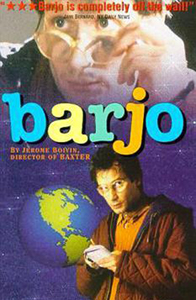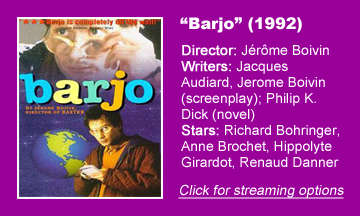In a cosmic coincidence, Philip K. Dick’s depressive yelling-into-a-void rants that make up his wonderful midcentury California novels share common ground with the comedic sensibilities of the French. Fittingly, director/co-writer Jérôme Boivin’s “Barjo” — which translates as “nutcase” and is based on “Confessions of a Crap Artist” (written in 1959 and published in 1975) – is the lone movie drawn from PKD’s non-SF catalog.
(It can be found here, with unfortunately too-literally translated subtitles — did they come straight from Google Translate? And you’ll want to change the Settings to 0.75 playback speed.)
Barjo is our guide
Boivin – whose career launched with a story of a dog (“Baxter”) just as Dick’s did with “Roog” — and co-writer Jacques Audiard adapt Dick’s novel reasonably faithfully, rearranging some scenes and bringing the schizophrenic title character, called Jack Isidore in the book, front and center.
In “Confessions,” the married couple rises to the fore, and Jack lurks on the sidelines because Dick needs a “crazy” person to serve as a foil to show that “normal” people are equally nuts. But understandably, a movie needs a more direct approach, so Barjo is our guide through his sister’s shattering marriage even as he himself experiences new aspects of life.
Messy-haired Hippolyte Girardot, who resembles Martin Short, is almost exactly how I pictured the character, although “Barjo” makes his craziness more cinematic, less internal.
Barjo invents weird things like a suitcase that can transform into a shower, he regularly takes a whiff of his bag of milk bottle caps to relax himself, and – despite being a loner – he sits weirdly close to people.
Anne Brochet is also perfectly cast as Barjo’s sister Fanfan (Fay in the book), a dark- and short-haired, lithe and sexy woman who drives husband Charles batty mainly because she exists. Boivin often begins shots on Fanfan’s legs to emphasize the male gaze.
Richard Bohringer, although a good actor, perhaps projects too strong a presence as Charles; I feel like Charles should be more of a sad sack who comes alive during bouts of anger over the fact that Fanfan is her own person.
Renaud Danner and Nathalie Boutefeu are well-cast as polite Michel and mousey Gwen (Nat and Gwen in the novel), the younger couple whom Fanfan falls in love with upon seeing them kissing in the mists near a gas station.
Wryness instead of tragedy
“Barjo” leans toward wry humor rather than “Confessions’ ” tragedy, especially when the jaunty theme song pops up. I suspect the French filmmakers aren’t taking in Dick’s material exactly like he intended, but nor are they misinterpreting it.
Stunning scenes from “Confessions” come off flatter in the film, like Charles beating Fay because she asked him to buy Tampax at the store, and the conclusion where he kills all the animals on their farmstead (the ultimate cry for help from Dick, an animal lover). The meaning isn’t lost, but it’s melancholy rather than lump-in-your-throat tragic.

It’s a good thing that I’m familiar with the novel, because that’s essential to following this cut of “Barjo” that’s lacking crisp subtitles. In one thread that’s unique to the film – when Barjo and his nieces watch a SF TV program that offers on-the-nose lessons pertaining to his situation (and even stars Barjo himself) – I was bored, but this material probably underscores Barjo’s journey of awakening.
For PKD die-hards, “Barjo” is worth watching as a curiosity, as it’s delightful to see scenes from one of PKD’s realist novels performed by good actors in a professional film.
Casual PKD fans will certainly want to read “Confessions of a Crap Artist” first, and even then, they’ll enjoy the film more if they are fluent in French or if they can find a version with accurate subtitles.


